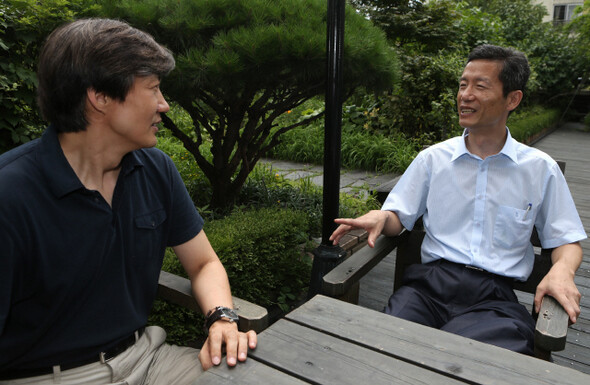hankyoreh
Links to other country sites 다른 나라 사이트 링크
Activist alleges his torture was directed by China’s central government

By Ha Eo-young, staff reporter
Kim Young-hwan said on August 1 that a state security official in Dandong consulted with Beijing before his alleged torture.
The North Korean human rights activist said the torture began in earnest after this consultation on Apr. 10, the thirteenth day of his detention in China.
Kim also said a Chinese state security official presented him during questioning with private posts he had made on a North Korean human rights web site, which appeared to have been obtained through hacking.
His account appears likely to fuel the ongoing controversy over the allegations, as he suggested the torture took place under orders from the Chinese central government, which illegally obtained evidence to support its charges against him.
Beijing has made no official statement on Kim’s allegations.
Kim’s latest account came in “Cho Kook’s Encounters,” a regular Hankyoreh interview feature with Seoul National University law school professor Cho Kook, 47.
In the interview, Kim said that after discovering his identity, his interrogators seemed to look to the central government in Beijing for direction in handling his case.
“After [the state security department] learned who I was, a senior official came to the department and spent a long time trying to talk me out of refusing to make a statement, telling me ‘no one walks out that door without making a statement,’” he said.
Kim also alleged another form of abuse, saying he was prevented from lying down to sleep for roughly a month after his interrogation. This comes after previous allegations of electric shocks, beatings, and sleep deprivation.
“There was no bed, and we weren’t allowed to rest on the sofa,” he said. “Even the Agency for National Security Planning [the predecessor of the South Korean National Intelligence Service, or NIS] had a bed when I was being questioned there twenty years ago. Not only could I not get a proper sleep, but I couldn’t bathe for a full month.”
Kim also discussed the possibility of a connection with Seoul in mentioning his North Korean human rights campaign in China. When asked whether the NIS was involved, he said, “Not directly, no, but it would be in violation of South Korean law to engage in that kind of activity without notifying the government.”
“But I wasn’t able to give detailed notifications to the Foreign Ministry, so I just gave a general announcement to the NIS,” he added.
The NIS also provided information on physical safety to Kim and other activists working for North Korean human rights.
“They never gave us any specifically dangerous information,” he said. “They would give us comprehensive information about how North Korean special forces had been sent to China for what appeared to be purposes of terrorism, or how China had been cracking down on North Korean defectors the past few months, things like this.”
Kim added that he thought entering China would be impossible for ten to thirty of his group’s officials, rather than a small group like himself and the other three activists who were detained.
“But we do a lot of other things, too, so I hope we can get a bit more attention from the public as a North Korean human rights campaign,” he said.
Please direct questions or comments to [english@hani.co.kr]

Editorial・opinion
![[Column] Park Geun-hye déjà vu in Yoon Suk-yeol [Column] Park Geun-hye déjà vu in Yoon Suk-yeol](https://flexible.img.hani.co.kr/flexible/normal/500/300/imgdb/original/2024/0424/651713945113788.jpg) [Column] Park Geun-hye déjà vu in Yoon Suk-yeol
[Column] Park Geun-hye déjà vu in Yoon Suk-yeol![[Editorial] New weight of N. Korea’s nuclear threats makes dialogue all the more urgent [Editorial] New weight of N. Korea’s nuclear threats makes dialogue all the more urgent](https://flexible.img.hani.co.kr/flexible/normal/500/300/imgdb/original/2024/0424/7317139454662664.jpg) [Editorial] New weight of N. Korea’s nuclear threats makes dialogue all the more urgent
[Editorial] New weight of N. Korea’s nuclear threats makes dialogue all the more urgent- [Guest essay] The real reason Korea’s new right wants to dub Rhee a founding father
- [Column] ‘Choson’: Is it time we start referring to N. Korea in its own terms?
- [Editorial] Japan’s rewriting of history with Korea has gone too far
- [Column] The president’s questionable capacity for dialogue
- [Column] Are chaebol firms just pizza pies for families to divvy up as they please?
- [Column] Has Korea, too, crossed the Rubicon on China?
- [Correspondent’s column] In Japan’s alliance with US, echoes of its past alliances with UK
- [Editorial] Does Yoon think the Korean public is wrong?
Most viewed articles
- 1‘We must say no’: Seoul defense chief on Korean, USFK involvement in hypothetical Taiwan crisis
- 2N. Korean delegation’s trip to Iran shows how Pyongyang is leveraging ties with Moscow
- 3‘Weddingflation’ breaks the bank for Korean couples-to-be
- 4Korea sees more deaths than births for 52nd consecutive month in February
- 546% of cases of violence against women in Korea perpetrated by intimate partner, study finds
- 6[Column] Park Geun-hye déjà vu in Yoon Suk-yeol
- 7Will NewJeans end up collateral damage in internal feud at K-pop juggernaut Hybe?
- 8Amnesty notes ‘erosion’ of freedom of expression in Korea in annual human rights report
- 9[Editorial] New weight of N. Korea’s nuclear threats makes dialogue all the more urgent
- 10[Column] Yoon’s first 100 days should open our eyes to pitfalls of presidential system